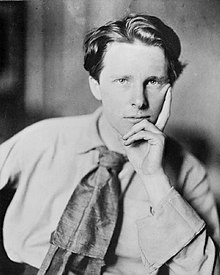Rupert Brooke
Jump to navigation
Jump to search

Rupert Chawner Brooke (3 August 1887 – 23 April 1915) was an English poet.
| This article on an author is a stub. You can help Wikiquote by expanding it. |
Quotes[edit]
- "And when we die,
All’s over that is ours; and life burns on
Through other lovers, other lips," said I
—"Heart of my heart, our heaven is now, is won!"
"We are earth’s best, that learnt her lesson here,
Life is our cry. We have kept the faith!" we said.- "The Hill" (1910)
- Cities, like cats, will reveal themselves at night.
- Delphi Complete Works of Rupert Brooke (2013) [1]
- Oh! Death will find me, long before I tire
Of watching you; and swing me suddenly
Into the shade and loneliness and mire
Of the last land! There, waiting patiently,
One day, I think, I'll feel a cool wind blowing,
See a slow light across the Stygian tide,
And hear the Dead about me stir, unknowing,
And tremble. And I shall know that you have died,
And watch you, a broad-browed and smiling dream,
Pass, light as ever, through the lightless host,
Quietly ponder, start, and sway, and gleam—
Most individual and bewildering ghost!—
And turn, and toss your brown delightful head
Amusedly, among the ancient Dead.- Sonnet (1908-1910)
- And in my flower-beds, I think,
Smile the carnation and the pink.- "The Old Vicarage, Grantchester" (1912)
- Stands the Church clock at ten to three?
And is there honey still for tea?- "The Old Vicarage, Grantchester" (1912), concluding lines
- If I should die think only this of me:
That there's some corner of a foreign field
That is for ever England.- "The Soldier" (1914)
Quotes about Rupert Brooke[edit]
- You ask about Rupert Brooke. Considering we were on Christian name terms, I did not know him well, though enough to contradict the legends that the press are weaving round
his namehim. He was serene, humorous, intelligent and beautiful—as charming an acquaintance as one could desire—and latterly most friendly. But he was essentially hard; his hatred of slosh went rather too deep and affected the eternal water-springs, and I don't envy anyone who applied to him for sympathy. The sonnets, on which his reputation is evidently to be based, differ from all his previous work, which was rebellious and unorthodox. They were inspired by his romantic thoughts about war, not by his knowledge of it; that also, had he been spared to gain it, he was hoping to express, and, knowing his grim and grotesque realism, I feel sure that he would have expressed something besides the Holiness in which—to me so inappropriately—his work concludes. I don't know whether the above conveys anything to you. If it errs on the side of unkindness he himself wouldn't like it the less, for he was extraordinarily free of conceit and sincerely desired to be done by as he did. But he goes down to posterity as a sort of St Sebastian, haloed by the Dean of St Paul's, and hymned by the Morning Post as the evangelist of anti-Germanism. As far as I dare speak for Rupert, how he would hate it, or rather laugh at it.- E. M. Forster to Malcolm Darling (2 August 1915), quoted in Selected Letters of E. M. Forster. Volume One, 1879–1920, eds. Mary Lago and P. N. Furbank (1983), p. 227
- I began Rupert Brooke's poems and the memoir at the beginning. I was extraordinarily impressed, particularly by the letters – they, I think, bring out more than anything the situation I have tried to show in my editorial, that the beauty of living has gone out of the youngest generation... I felt very envious reading, particularly the parts about Rugby and friendship. I do honestly think that that is something that went out of the world in 1914, at least for one generation.
- Evelyn Waugh, diary entry (22 November 1921), quoted in The Diaries of Evelyn Waugh, ed. Michael Davie (1976), p. 147
External links[edit]
- ↑ Brooke, Rupert. Delphi Complete Works of Rupert Brooke (Illustrated). Delphi Classics. p. 123.

